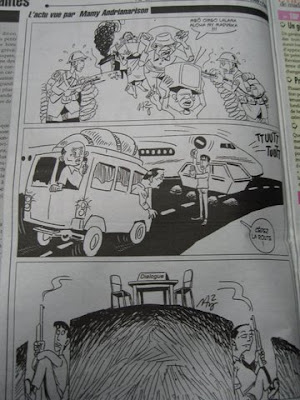We were hired by SIK a Norwegian Centre for Intercultural Communication. Financed by Fredskorpet they have an exchange with the University of Toliara. Two persons from Norway go to Toliara and two Malagasy go to Stavanger to do research work in an archive that has plenty of materials on Madagascar that is not available there.
In Toliara we had mainly 2 tasks: run an independent research (we could choose the topic), and teach English at the University Language Centre.
The second task occupied most of our time in the beginning (together with a basic Malagasy language course), as we had to prepare the courses, re-adjust them to the capacity and needs of the students, find material, etc. We had to find a way of teaching that could fit our capacities and the goals of the students.
As for the research, the topics we were planning to investigate needed to be changed due to the political unrest that started in the end of January 2009. At that time offices weren’t reliable, and honestly we didn’t even know if we were going to be evacuated or not. During those weeks we tried to rethink our researches and we found two topics that interested us, that are related to the crisis and that we hoped were feasible even given the situation. Our goal is to produce a relatively short article accessible to a larger public than just scholars.
Birger is looking at the role of the Malagasy High Constitutional Court in the political crisis. A court that declared the power shift in Madagascar was legal, while it was generally labelled as a coup d’etat all over the world. The article is not just for lawyers, on the contrary it can be entertaining as it tries to understand also the (strange?) logics behind the HCC’s decisions.
I am working on a case of land grabbing. Daewoo Corporation was planning to lease 1.5 million hectares in Madagascar to produce corn and palm oil. Those products would have been sent to South Korea to meet internal food needs. The “Daewoo case” is acknowledged to be one of the causes of the unrest in the country leading to the power shift. I’m trying to understand why this case provoked so much the Malagasy, as well as what the project was really about, what procedures were followed and what happened to it… So far it has been a very interesting topic, because it permitted me to work with cultural and historical aspects as well as economical and political ones, furthermore I had to look into the very complicated yet interesting Malagasy land management (and titles) system.
It is soon time to leave Madagascar and go back to Norway. We still have a month ahead to finish up our work…

















































